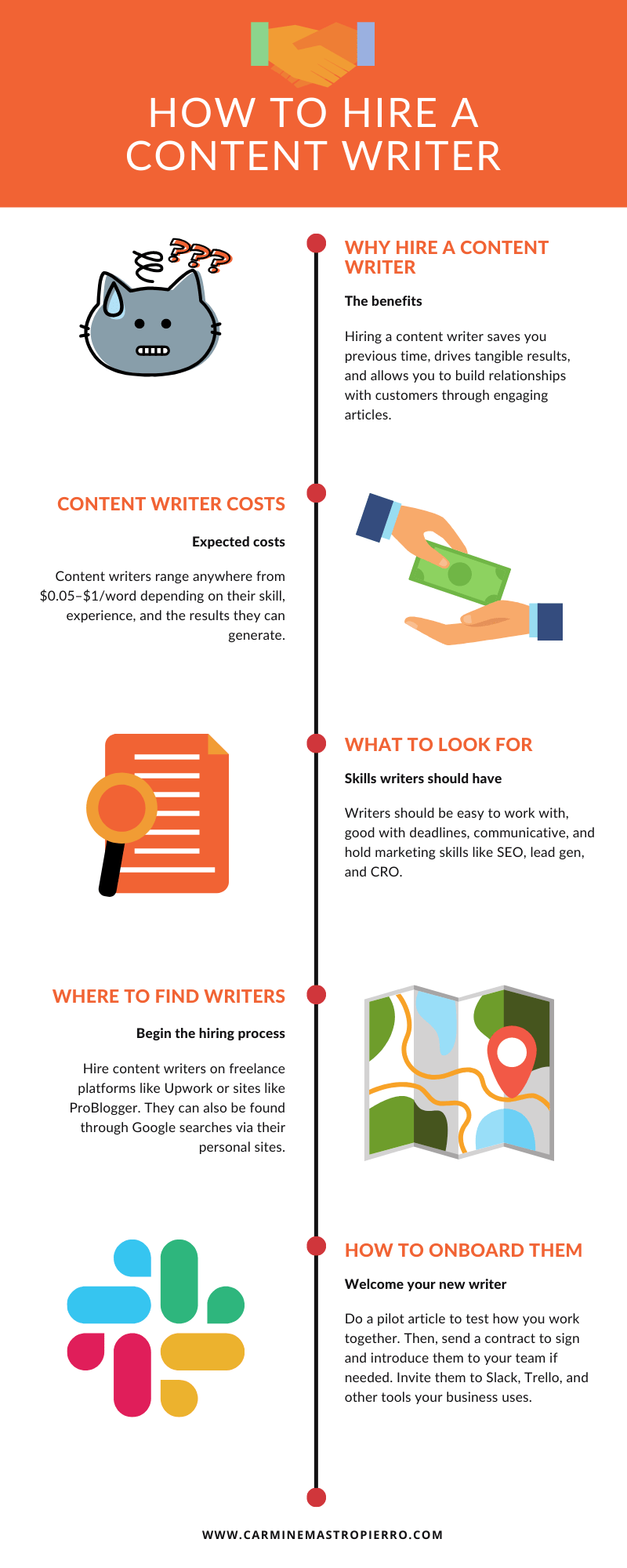B2B companies that post 11 times or more per month generate 3x the traffic of businesses that only blog once per month.
What kind of results are you currently getting from content on your website?
If it’s non-existent, you may need to hire a content writer.
Good writers like myself are experts at SEO, lead generation, and other marketing fields that help us create content that produces results.
Imagine opening up Google Analytics and how much your jaw would drop when you see the flood of new traffic coming in thanks to great content.
Add a basic funnel along with it, and you’re going to have customers naturally knocking on your door.
Doesn’t that sound like a dream?
I’ve quadrupled my client’s organic traffic, helped them rank #1 on Google for target keywords, and more.
Now that I have you riled up, let’s talk about how to hire a content writer yourself!
Why hire a content writer
I know, I know.
Can’t you just write content yourself and not hire anyone?
Sure.
But you have to be willing to spend hours researching, outlining, writing, editing, and doing countless other tasks.
That’s not to mention you have to study and practice becoming an excellent writer.
Or you can invest in a good content writer and reap these benefits:
It saves you precious time and energy
Whether writing is a strong point for you or not, outsourcing to a content writer gives you time back.
You can focus on other activities that you’re better suited for like nurturing customer relationships, launching new products, and creating campaigns.
This will have a much greater ROI than trying to publish content when you could hand it off to a professional like me.
In fact, consider what HubSpot found in a study analyzing a Marketer’s average day.
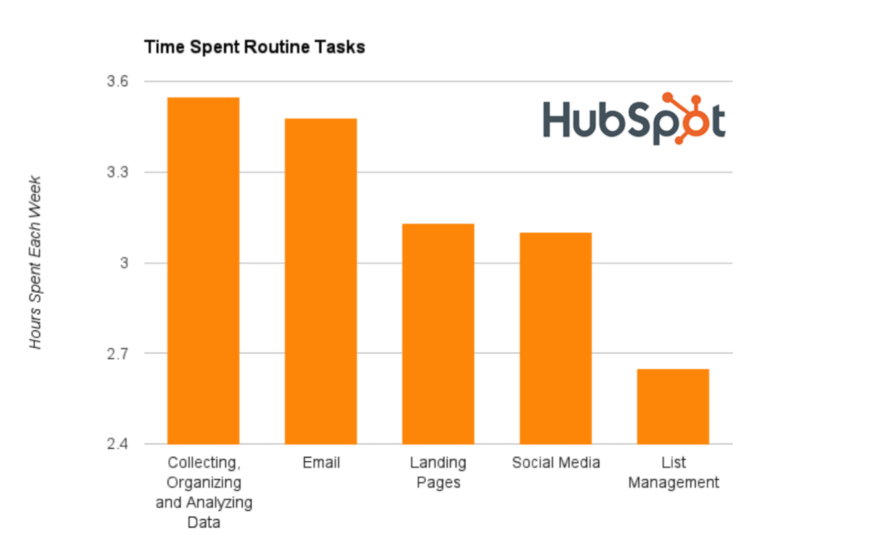
More than 3.5 hours are spent collecting, organizing, and analyzing data.
I normally set up Google Analytics tracking and other analytics for my clients when we do content writing retainers.
This helps us determine the highest-performing content, trends, and opportunities.
Next is email. Don’t worry about content writing and get back to speaking with clients, customers, and team members.
I regularly write landing pages and social media copy for clients as well. You might find this takes up several hours per week like HubSpot’s study found.
Last but not least, list management. Managing a CRM and contacts can take up more than 2.5 hours per week but it’s necessary to stay organized.
Hire a content writer, grow your business, and get back to more important tasks.
Good writers drive results
Here’s what really grinds my gears…
There’s no shortage of freelance writers these days.
The problem is that they haven’t developed the skills to turn their writing into dollars.
What do I mean by this?
Well, content isn’t created to look pretty and sit on a blog.
It needs to drive results. Traffic. Leads. Something tangible.
That won’t happen unless a writer has mastered SEO, lead generation, funnels, and other critical marketing skills. (More on that later!)
For example, I have grown my own businesses with those practices and others. I am able to transfer those skills into writing for my clients to produce awesome results.
Hire a great writer and you’ll watch traffic and MQL shoot through the roof.
In fact, the average visitor-to-subscriber conversion rate is 19%.

Writers should be able to help you achieve this kind of growth or more. However, it’s a small percentage that can.
For example, I normally research topics and keywords that help attract my client’s buyer persona.
These are also weighed against the domain authority and competition. I target search terms I’m confident we can rank for and drive traffic with.
I make sure that it aligns with the middle of the funnel next. This is by embedding lead magnets and pushing visitors deeper into the website to get gated assets.
Calls to action and strong sales copy push readers to take action. I regularly generate clients significant amounts of leads and customers with this approach and I’m just scratching the surface.
Content is mandatory nowadays
PPC, cold calling, and traditional advertising work. But it’s losing steam.
Consumers are used to being interrupted to the point it’s become annoying.
What happens as soon as most people see a commercial or ad? They take out their phones or hit the skip button.
I can’t blame them. The average person sees 5,000 ads per day. Yes, you read that right.
They also have all of the world’s resources at their fingertips to research a product or brand.
As I like to say: you need to lay a mousetrap, not use a sledgehammer.
That means producing high-quality and contextual content for your ICP.
Solve their problems. Answer their questions. Give more than you take and develop a relationship.
It will result in leads, sales, and organic growth.
How much does it cost to hire a content writer?
Alright, now that you know why you need to hire a content writer, let me explain how much it costs.
As a rule of thumb, if it sounds too good to be true it probably is.
What I mean by that is to avoid any freelance writers that undercharge.
You’re going to get what you pay for. Point, blank, period.
Cheap writers are difficult to work with, require countless revisions, and sometimes ghost out of nowhere.
Contrast that with a professional content writer who works with big brands and has years of experience.
That comes at a premium though.
Expect to pay the best content writers anywhere from $0.50–$1/word on average. Retainers are typically packaged up and sold on a per-project basis.
These services will also include SEO, editing, proofreading, distribution, revisions, and other add-ons that make the high price tag worth it.
Writers may charge in a variety of ways, however. These include:
- Per word: This is a classic form of structuring freelance writing rates that stems from journalism and magazines. It makes it very easy to measure how much you will be paying writers.
- Per hour: Another common form of payment but requires you and the writer to preferably use a tool for hourly logs.
- Per project/retainer: Professional writers will have packages for you to choose from that include very specific deliverables on a monthly basis.
How to hire a content writer
These are the steps you need to take to find talented writers that move the needle.
Step 1: Determine your content goals
Every business has different goals and KPIs.
That’s why the first step is to determine what is important to your company, and ultimately what you want out of content.
Here are the main ones, and they will change how you approach the process.
Organic traffic
Writing a couple of short blog posts and publishing them twice per month isn’t going to cut it if you want to crush it in the SERPs.
Search engines are competitive, and Google’s algorithm is smarter than ever these days.
This means that if you want to generate high amounts of organic traffic, you need to find a writer who’s experienced in on-page SEO and keyword research.
They will be able to conduct keyword analysis to find search terms that you can rank for, and attract relevant users.
For example, you wouldn’t want to target insurance-related keywords if you’re a real estate company.
Additionally, they should understand best practices for on-page SEO like optimizing title tags, meta descriptions, keyword density, formatting, etc.
Revenue
A good content writer will easily be able to generate sales for your company.
They will intertwine your products or services with calls to action and other copywriting strategies that make users drool at the mouth.
For example, an experienced writer can mention a product in an article, but it doesn’t seem like a pitch because it’s so naturally implemented.
Too many businesses make blog posts into mini sales letters, and it never gets them the results they’re after.
That’s why you need to hire a good content writer. He or she will take care of these headaches for you, while bumping up your sales.
Leads
The third biggest reason that companies wish to produce content is for lead generation.
Paired with good SEO, articles that attract heaps of users from search engines can capture them at the same time for re-marketing.
This requires two things:
- The writer needs lead gen experience to properly add calls to action, lead magnets, and other ways to capture users within the content.
- You need to have a lead generation funnel already in place for the writer to take advantage of. This can be as simple as a free e-book in exchange for a newsletter subscription.
Once you’ve determined your goals, you can move on to the next step.
Step 2: Decide what you want in a writer
Naturally, you’ve probably thought “What skills should a content writer have?” and here they are:
Industry experience
Having experience writing for an industry is huge.
It implies that they understand the consumers, trends, and products within it like the back of their hand.
This results in an easier writing process for both parties and improved results for your business.
However, it’s a double-edged sword.
I wouldn’t immediately disqualify a writer if they don’t have much or any experience in your market.
For example, while I mostly focus on B2B niches, I’ve written for health, blockchain, and other industries that I knew little about.
But, I have excellent research skills. I collect market reports, reviews, testimonials, competitor websites, and other references.
I then study these materials inside and out until I am an expert on the business.
That’s what any experienced writer will do, so keep that in mind while hiring.
Marketing skills
Content needs to do something.
Not just sit there on your website and collect dust.
Unfortunately, so many companies hire writers who don’t know jack all about SEO, CRO, and other important marketing fields.
What’s the point?
Without these things, content doesn’t do anything.
That’s why I highly suggest looking for real-world marketing skills in writers that you’re hiring.
These include:
- Search engine optimization
- Email marketing
- Social media marketing
- Conversion rate optimization
- Lead generation
- User experience
A good attitude
I don’t know about you, but I refuse to work with anybody that has a bad attitude.
No, thank you.
Money is great, but it’s not worth your happiness and all of the headaches that come with a negative client or writer.
That’s why you should seriously consider how the writer’s personality and attitude align with your own values.
Would they be fun and easy to work with?
Usually, you can gauge this after a single phone call.
However, I would also recommend having a trial period in place where they write a single piece of content for you.
This allows you to see if you work well together.
Step 3: Best ways to hire content writers
Now for the fun part: hiring!
There are many different approaches you can take to finding writers for your business, and it’s best to use a variety to maximize candidates.
Here are some of the most popular ways to do so.
ProBlogger and other freelance writing job boards
There are many job boards on the internet that are completely dedicated to freelance writing and will help you find blog writers for hire.
I suggest that you read my previous content on hiring freelancers and managing them for further information on this topic:
- The 8 Best Freelance Websites to Build Insanely Effective Remote Teams
- 5 Freelance Writing Job Boards For Earning Big Cash and Hiring Amazing Writers
- Freelance Writing Rates – What to Pay/Charge
Many of these job boards enable you to create a job listing for free or at a reasonable price like ProBlogger.

You can create a listing by clicking “Post a job” under the jobs section.
ProBlogger will require you to set up a company account, and afterward you can create the job posting, beginning with the type of position.
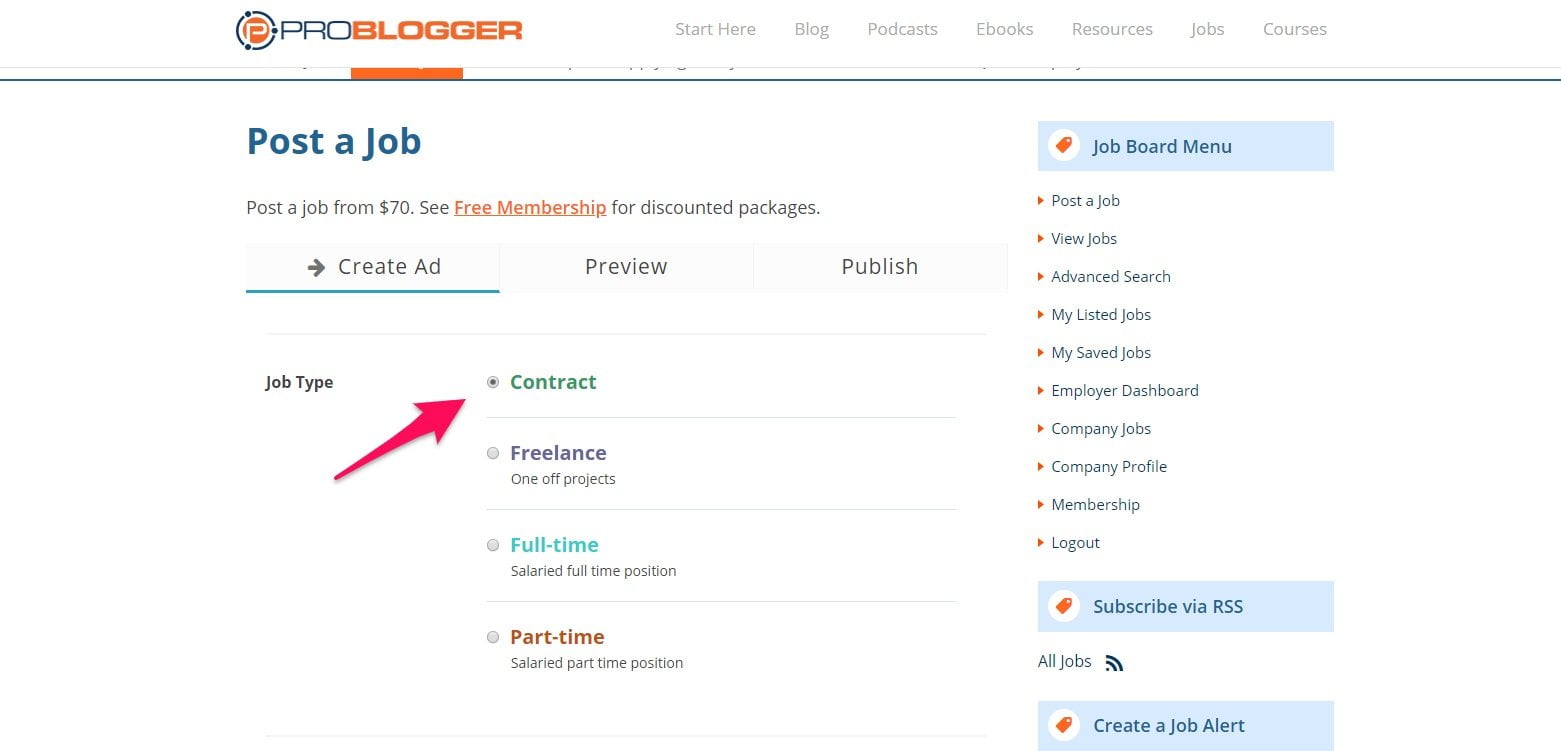
Scroll down and enter a title and description for the content writing job.
The title should be as descriptive as possible, elaborating on the niche and exact role.
The description is where you can go into great detail about requirements, duties, and other important information for applicants.
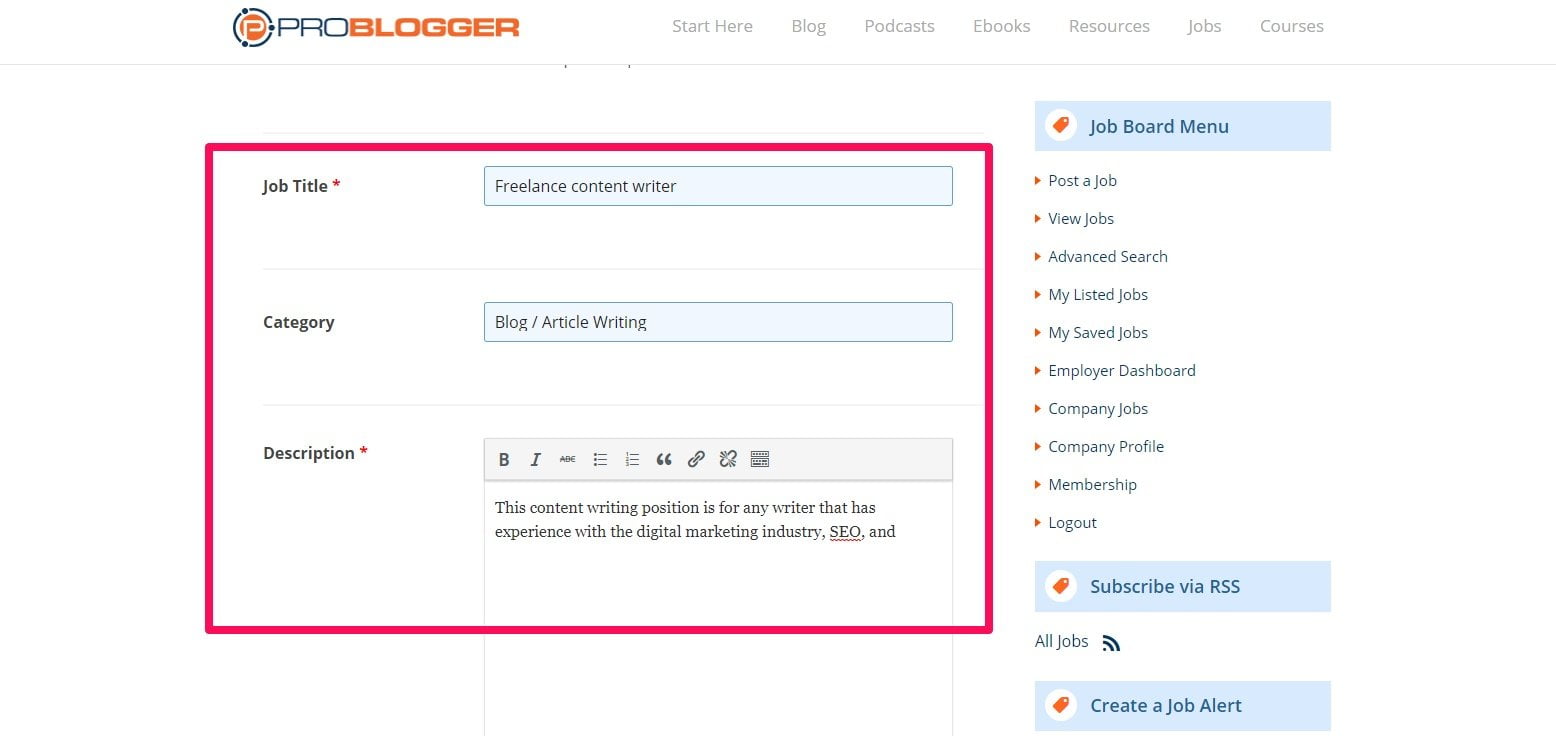
Under “Company Information,” enter the type of business you operate, the name, URL, and contact email.
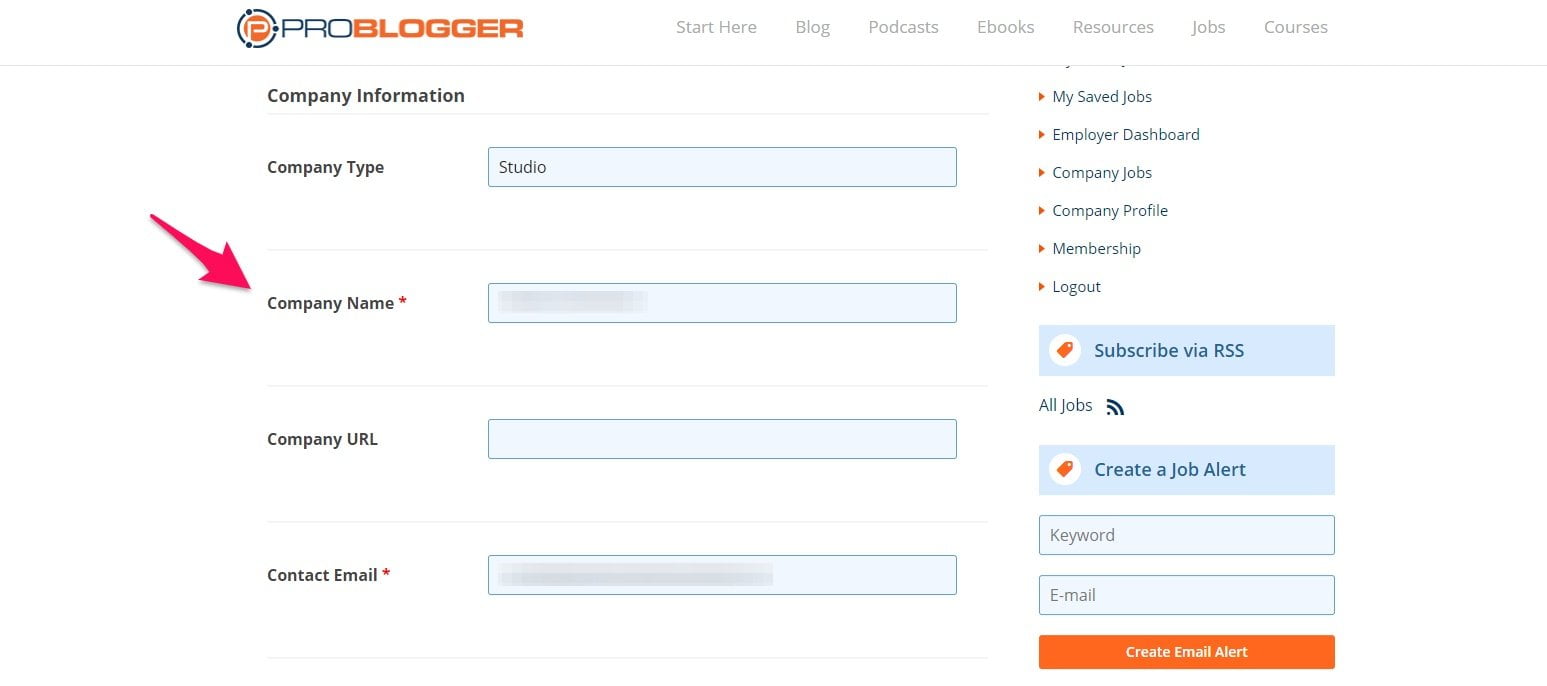
The last step is to choose the listing type, add application instructions, and preview the posting before paying.
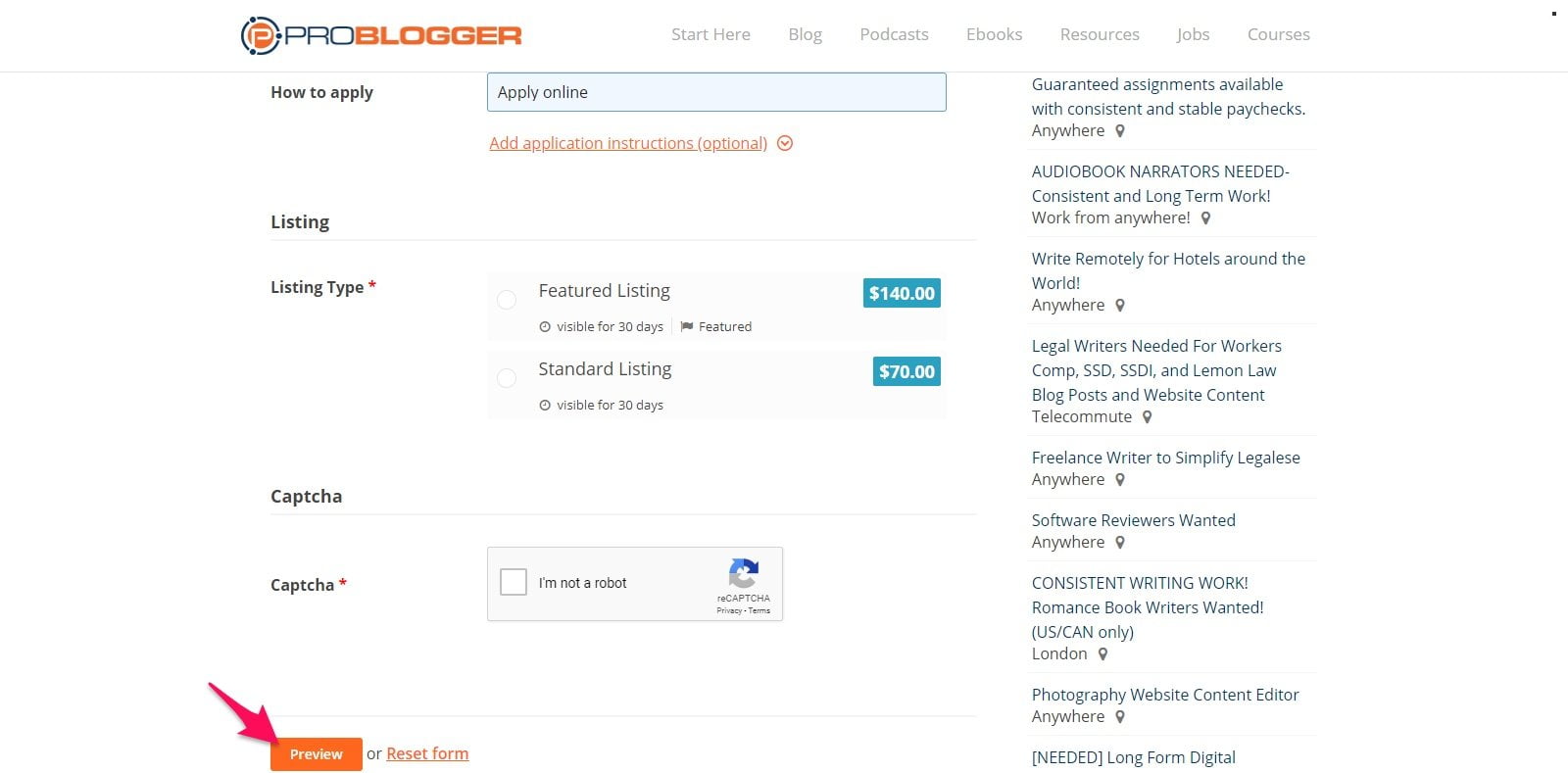
Don’t be surprised if you get hundreds of applicants, as it isn’t uncommon for that to happen.
I also suggest checking out the following job boards to create more listings:
Shortlist the writers that stand out from the crowd, and follow the next steps I’ve laid out ahead for the best results.
Use Reddit to hire content writers
Reddit is the largest website on the internet.
Naturally, it’s a good place to find writers.
There are subreddits that can be used to hire writers, find freelancers, and post jobs.
Freelancer writers are also allowed to post resume threads that help you scope out talent more easily.
Read my article on the best writing subreddits to learn more.
Visit a subreddit like /r/writersforhire to begin.
Go through the threads and read the titles carefully. Look for any keywords related to what you’re searching for in a writer.
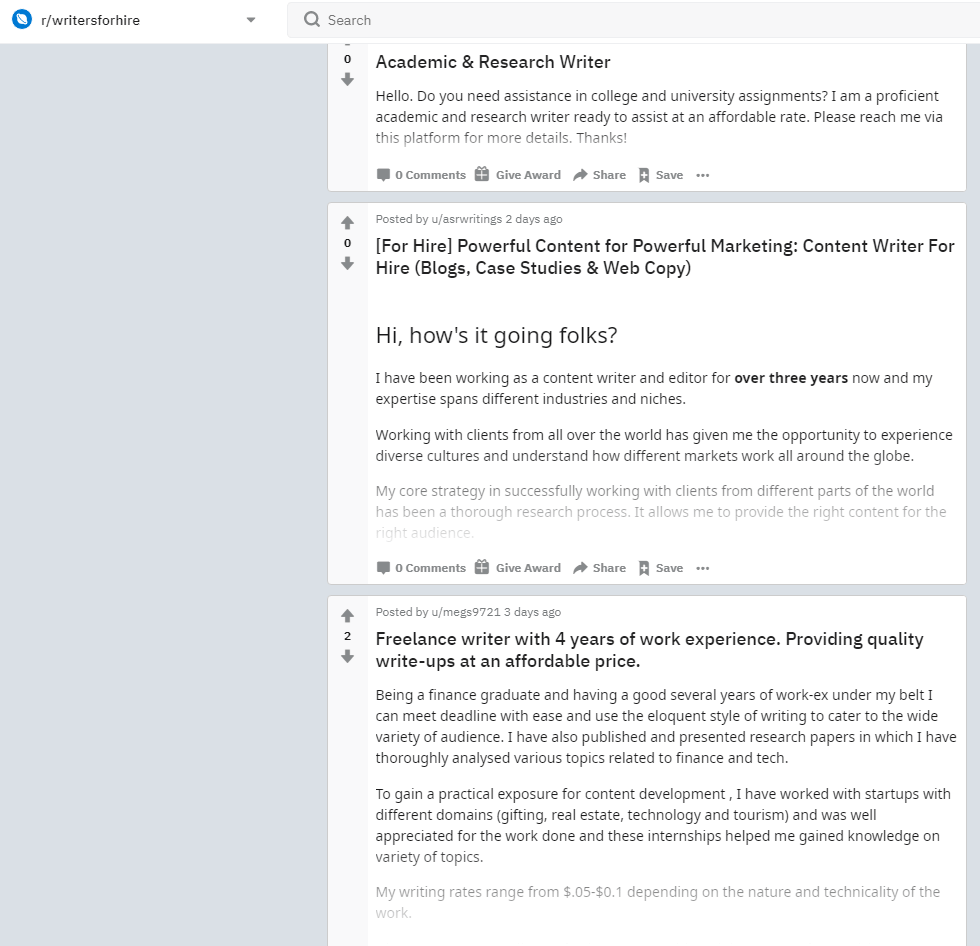
This might be skill level, experience, niche, industry, etc.
Click a thread and look for all of the recommendations I laid out earlier. These include:
- What marketing skills do they have that can translate into results for your business?
- Is the writer’s process structured and organized?
- Do they charge a fair amount for their work?
- Does their personality shine through their writing?
- Etc.
Find the contact information of the writer in the thread. They will either link to a website, or email, or tell you to privately message them.
You can also take the opposite approach by making your own thread. Prepare to be bombarded. When I’ve done this to find junior writers, I could easily get dozens to hundreds of applicants.
Click the “Create Post” on the right sidebar.
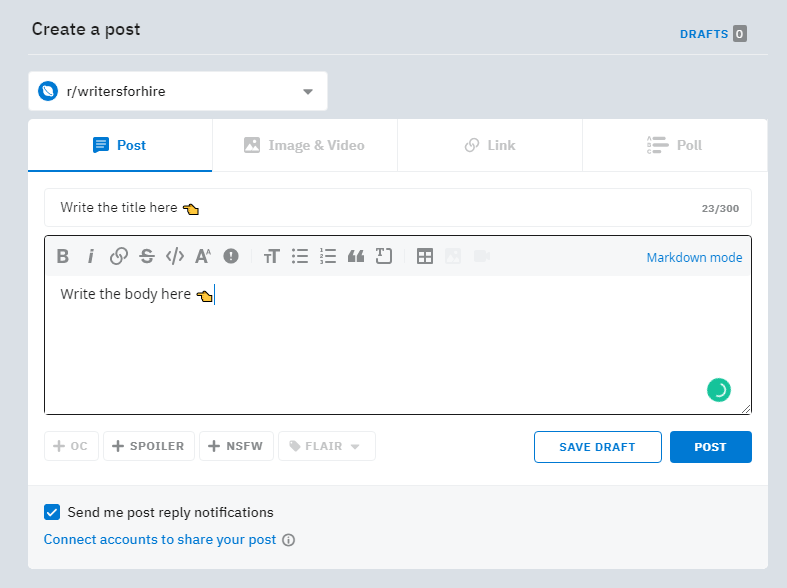
Enter a title that explains the position you’re hiring for.
The body of the thread should detail how much you will compensate writers for, the requirements, and job responsibilities. Go into as much depth as possible.
Click the “Post” button once you’re finished.
Follow up with any candidates that seem like a good fit for the position.
Tap your network
Did you know that a majority of jobs are filled through networking and word of mouth?
The same goes for finding good content writers.
For example, I’ve written for Neil Patel, GoDaddy, Marketo, and other large businesses.
People commonly rave about my services and I get referrals without asking.
That’s why you should tap your network to see if colleagues know any writers for hire.
The best way to begin is by personally sending out a text message, DM, or email to specific people.
Do you know any other marketers or executives who manage writers? These should be at the top of your list.
Ask them if they know any writers available to work or how they found them.
Then, send out a broadcast to reach the most amount of people possible. LinkedIn is great because it’s built for professionals.
Write a message like:
{Company name} is searching for a talented and exciting content writer to take on {Project}.
If you know anyone that would fill this role perfectly, please send them my contact information.
People will comment on the post, tag others, and give you suggestions.
Easy as pie!
Hunt them out
The best writers aren’t on Upwork.
…Or Guru.
…Or job boards.
Do you know where they are?
On their own website.
People like Jacob McMillen, Aaron Orendorff, and myself charge a premium and have created personal brands.
Clients come to us organically to form relationships and pitch projects.
That’s why I recommend you start your hunt on Google.
Search for keywords like:
- Content writer for hire
- Freelance content writer
- Etc.
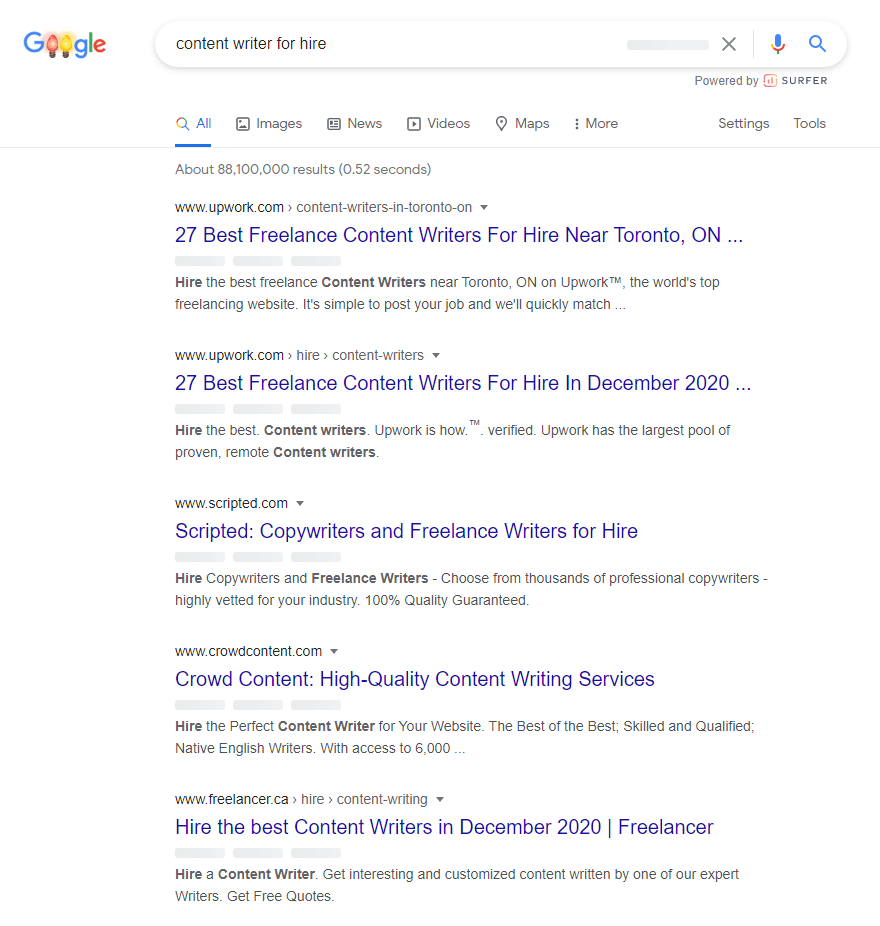
Go through several pages and check out the websites of any prospects you find.
Save the URLs or their contact information in a CRM to stay organized.
Reach out to writers that you think would be a good fit and have a discovery call to chat about what you need.
Step 4: Ask the right questions
Here are some important questions to ask writers, which allow you to gauge their skill and expertise.
How long have you been writing?
Perhaps the simplest and most basic question is asking how long they’ve been a writer.
Writers who have been honing their craft for years will have better work practices, and research skills, and overall will be easier to manage.
However, this isn’t to say that a new talented writer should be disregarded.
Newer writers may be hidden gems, offering a great attitude and willingness to do well.
If experience is a deal breaker for you, look for at least two years or more of content writing.
What marketing skills do you have?
As I mentioned earlier, it isn’t enough to just be great at writing.
You’re a business owner, and you want results.
That means writers need to have fundamental marketing skills alongside writing potential.
Otherwise, their writing won’t achieve anything.
Content needs to be optimized for search engines, integrate lead generation tactics, and align with your brand’s message.
Dig deep into the writer’s marketing knowledge to see if they have refined any of these skills.
As I mentioned previously, I would look for expertise in the following fields or similar:
- Lead generation
- Search engine optimization
- Conversion rate optimization
- Branding
- Social media marketing
- Email marketing
- Content marketing
What results have you generated for your previous clients?
If applicants have improved revenue, leads, or other notable KPIs for previous clients they’ve written for, then they may be worth your while.
This implies that they can replicate those same outcomes for your business, especially if it’s in the same niche.
I recommend asking how they planned to achieve these things to ensure that it wasn’t luck or randomness.
Asking this will also allow you to dig deeper into their process, which is the next question.
Some content writers for hire may also have testimonials and case studies on their website you can read.
Testimonials let you see that other businesses trust and vouch for them.
Case studies display the process and results they generate for other businesses.
What’s your writing process?
Writing good content takes time, organization, and skill.
Seasoned writers will have a thorough process, templates, and documents they use to speed up the efficiency of every project.
The sign of an experienced writer is not having any clear process when working on content.
For example, my content writing process looks a little something like this:
- I begin by researching topics that are relevant to the client’s buyer persona, so it only attracts high-quality users that can convert to leads. I’ll use tools like BuzzSumo, Ahrefs, while also digging into competitors and doing interviews if needed.
- I then research keywords I can center the content around to drive organic traffic.
- The actual writing process starts with creating a skeleton, fleshing out the major points and sub-points, and organizing references and resources that I’d like to use — those might be case studies, stats, and different data I find.
- After the draft is done, I’m editing, proofreading, and ensuring that the on-page SEO is good before handing it off to the client.
Once you have found the perfect writer, you need a proper onboarding plan to keep the process smooth as silk.
What’s your turnaround time?
As a writer for hire, I pride myself on having a fast and reasonable turnaround time. I’m writing copy and content for your business, so I don’t want to leave you hanging or delay your content calendar, for example.
That’s why I always ask writers I personally hire what their turnaround time is for different projects.
This allows me to gauge their workflow and how easy it would be to work with them overall.
However, be realistic. Don’t tell writers you need a 3,000 word article turned around tomorrow. It probably won’t happen.
How many revisions do you offer?
Let’s be real.
Very seldom will you receive a piece of copy or content and it’s perfect when you hire article writers.
Not to brag, but I do it all of the time with my clients.
However, there will be times when some edits and changes need to be made.
That’s why another question that’s good to ask freelance writers is the number of revisions they offer and what extra edits cost.
I personally offer unlimited revisions because I rarely go beyond a single round of revisions but some writers will charge you for more, so keep in that mind.
Step 5: Have an onboarding plan
You’ve gone through a couple hundred applicants.
You did the interviews and you found the one.
What’s next?
Onboarding them.
Here are the steps you need to take to smoothly onboard new writers into your company.
Have a trial period to test the waters
I personally love doing a trial period with my clients, and you should do them with your writers, too.
A trial period is a week or so in which you work together without any long-term commitment.
This ensures that you work well together and enjoy their writing process.
During this trial period, you might require the writer to produce a certain amount of content, work with your team, and act as if they had a permanent position.
This prevents you from hiring someone, and finding out later they are a pain to work with or you don’t align well.
Have a contract in place
A contract protects both parties.
I recommend using a tool like DocHub to create, sign, and send contracts over email.
Sign up for a free account from their homepage to begin.

The dashboard displays recent contracts, and activity, and you can create a new document by selecting “New.”
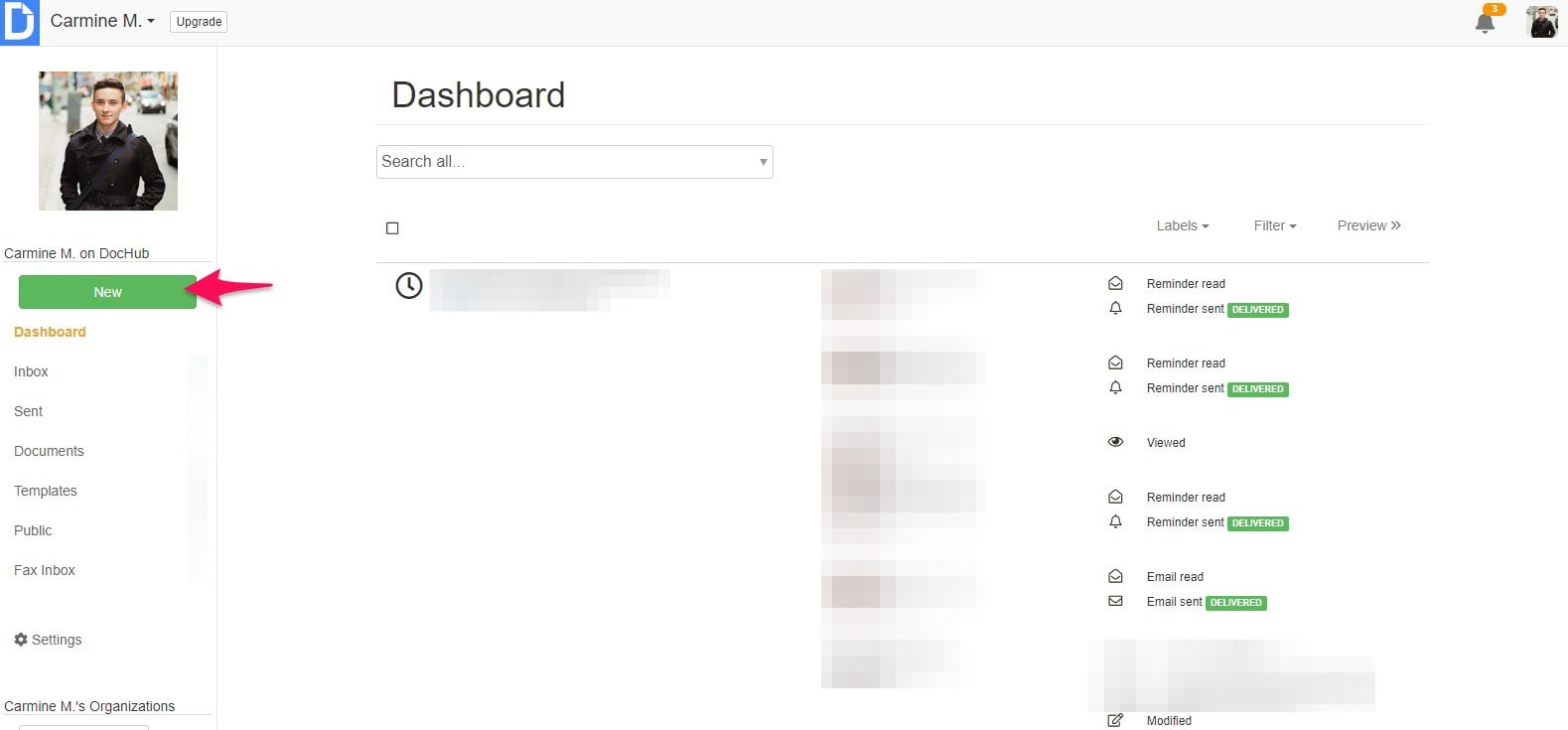
Enter in the details of the contract, and add areas for signatures. You can assign an email to one of the signature slots, and send it out after you’re finished.
Make sure to include sections like:
- Scope of work: How much content does the writer have to produce every month? Mention word count, turnaround time, and other details.
- Payment: How much are you paying the writer for this project? How will the invoice be paid and how often?
- Legal: What legal measures will be taken if either party doesn’t follow the rules laid out in the contract?
Here are some good resources on writing contracts:
- How to write a one page contract
- Sample freelance writing contract
- Professional Writers Association of Canada’s guide to contracts and negotiation
Final thoughts on how to hire a content writer
Hiring a content writer can be a lengthy and complex process at times.
But, there are steps you can take to make the process smooth as a baby’s bottom.
The first step is to determine what your goal is with content. Are you trying to generate revenue? organic traffic? leads?
Secondly, decide what you’re looking for in a writer. This includes industry experience, certain skills, and personality traits.
Then you need to use job boards like ProBlogger to begin receiving applicants.
Ask questions like how long they’ve been writing, what results they’ve created for other clients, and why they’re the best candidates.
From there, it’s all about having a good onboarding process, which consists of a solid contract and trial period.
Check out my courses on copywriting if you want to level up your writing skills and get mentorship from me.
